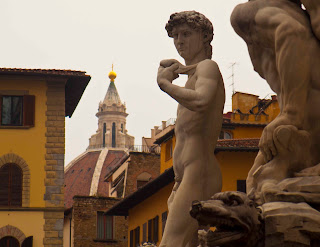Breathing the Tuscan air in Florence is a special thing, but even more so is the special Florentine atmosphere, which is not just the product of a historic fight over the ideas of what is man, but the lovely scent of the promise of what mankind will become - also makes its way into ones nostrils.
 | |
| The good company in florence: Dante, Boccacio and Petrach |
Florence in the Renaissance
The life in what became the republic of Florence is in some ways not comparable to the life of the modern day world, taking the following paradox into consideration, but rather its history is an inspiration and a standing testimony to the battle around the battle of what is man. The period of before and a little after the 15th century, is often thought of a kind of per-modern society, where the common man was entitled to play a leading in role in society, as a opposed to the Feudal suppression of man, most often associated with the middle ages. The lives of the men listed above supports the argument, because most of those were like Leonardo himself, not belonging to nobility but represented the new influence of the uncommonly talented common man or the symbol of the city itself, David, a human being applying his wit to slay the brute, imperial power that Goliath represented. Yet by the close of the 15th century out the around 90.000 people living in Florence, only about 3.000 were registered as citizens with equivalent rights. Although many voice were perhaps somewhat represented through Guilds of profession or other associations, it´s left to be said that 90% of the people were not represented in any way as were illiteracy as common as broad education was uncommon.
Duke Chews on head of Archbishop in Frozen Lake of hell
As Machiavelli documents in the history of Florence a centuries long fight between faction of the nobility had been fought. Dante Alighieri, who had been in the governing body of Florence for a while, also wrote about the stride between the Ghibellines and the Guelphs and also between the black and the white Guelphs, the latter of which he had been a part of. In the Devine Comedy he writes about the betrayal of the people by the Nobility, and send it deep down into hell for it deeds, so that people might read and laugh and not be captured by Fear. He condemns an Archbishop of his own time, to the frozen lake in the bottom getting his head chewed by the duke he had murdered:
 "His jaws uplifting from their fell repast, That sinner wip'd them on the hairs o' th' head, Which he behind had mangled, then began: Thy will obeying, I call up afresh Sorrow past cure, which but to think of wrings My heart, or ere I tell on't. But if words, That I may utter, shall prove seed to bear Fruit of eternal infamy to him, The traitor whom I gnaw at, thou at once shalt see me speak and weep. Who thou mayst be I know not, nor how here below art come:
"His jaws uplifting from their fell repast, That sinner wip'd them on the hairs o' th' head, Which he behind had mangled, then began: Thy will obeying, I call up afresh Sorrow past cure, which but to think of wrings My heart, or ere I tell on't. But if words, That I may utter, shall prove seed to bear Fruit of eternal infamy to him, The traitor whom I gnaw at, thou at once shalt see me speak and weep. Who thou mayst be I know not, nor how here below art come:But Florentine thou seemest of a truth, When I do hear thee. Know I was on earth Count Ugolino, and th' Archbishop he Ruggieri. Why I neighbour him so close, Now list. That through effect of his ill thoughts
In him my trust reposing, I was ta'en
And after murder'd, need is not I tell.
What therefore thou canst not have heard, that is, How cruel was the murder, shalt thou hear,
And know if he have wrong'd me".
Excerpt from CANTO XXXIII ( Source: www.gutenberg.org)
Amidst the ongoing fight, Dantes created the modern Italian language and overcame the split between poor farmers who spoke Italian and the higher guilds whose language was mainly latin at the time. Thus he helped to bring the culture out of the dark ages and sets into motion an evolution that ended with the overthrow of the nobilities brutal rule. Marked by the return of Cosimo de Medici’s return from exile in 1435 the renaissance had begotten a starting point together with the completion of the Dome. With the help of Nicholas of Cusa in the council of Florence, the old split between the eastern and the western church, was for a time, put aside. Platon was resurrected, most of writings that been available only to few scholars within the eastern part of the Roman Church, had been gained access to and were now systemically translated into Italian and made available in newly founded public libraries. The city state was officially run by the Signory, which now expanded and mad into a rotational system, more of a republic than an actual monarchy. This was the birth of modern form of governance and the Nation state, a birth ful of tension, rivalry, ianate competition, but most of all the atmosphere was fresh with the air of progress on all fronts, be it archietectecture, music, painting, statescraft or science leading even to Columbus’ discovery of America.
 |
| Ponte Vecchio - The Old bridge |





0 comments:
Post a Comment